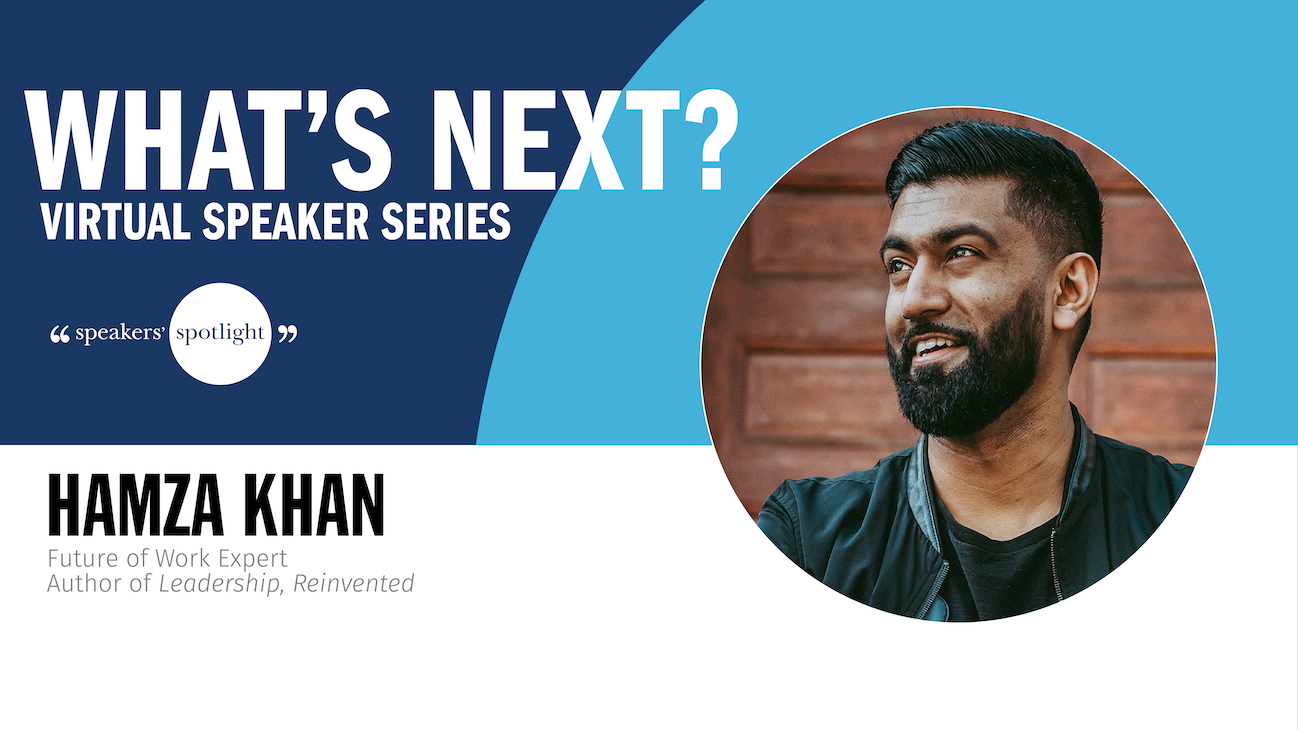Change isn’t coming, it’s already here. By 2030, 70% of the workforce will be affected by automation. This means 2 in 3 people will be forced to rethink their entire career game plan. That’s the bad news. The good news is that we’re going to be ok, because when it comes to adapting to change, as a species, humans are undefeated.
In this week’s edition of our Virtual Speakers Series, Hamza Khan took us on a rollercoaster of a ride through the future of work — the good, the bad, and the ugly. Coming off of a difficult year that has only accelerated the pace of change in the workforce, Hamza says, it’s more important now than ever for organizations to prepare themselves and their teams for the only constant in life — change.
This requires a new kind of leadership style, one that can operationalize four innate human abilities to ensure that the rate of change happening inside an organization far exceeds the rate of change on the outside — the key to survival in the future of work.
We Live in a V.U.C.A. World
When Hamza was with the Canadian Armed Forces, they taught him the acronym V.U.C.A., which describes the situation of constant, unstable change and gives a very accurate picture of our world right now. It stands for:
- Volatility: The speed and dynamism of change.
- Uncertainty: The unpredictability of events.
- Complexity: The multitude of factors to be considered.
- Ambiguity: The lack of clarity and obscurity of reality.
Crisis accelerates change, Hamza says, which is why at this point in the pandemic we are in “the quickening”. What organizations were originally going to accomplish in five years, they now must do in two years.
Historically though, most organizations fail when it comes to transformation, Hamza says, with McKinsey estimating that about 60% of organizations fail and Harvard Business Review increasing that to 70%.
Why? Hamza says it usually comes down to four reasons:
- Rotten corporate culture.
- Negligence: Businesses assume growth in their projections.
- Complacency: Organizations get “drunk” on success and stop innovating.
- Avoidance: Organizations are slow to confront the changing world around them.
It’s a law of the universe, Hamza says, that if disorder is left unchecked, it tends to only increase over time. So, a leader that avoids change can be assured that their circumstances will not get any better.
“Chaos, my friends, is hungry for failing organizations and it thrives when leaders are unprepared,” Hamza says.
How can we ready ourselves for the next crisis? If change is our only constant, then we need to prepare ourselves for it, especially as we move towards a future that will be dominated by new technology and automation. Thankfully, as humans we are already equipped with the qualities and skills needed to succeed.
Modern Leadership
We need a new type of leadership to meet the demands of the future. It’s time for a leadership reinvention.
The four hallmarks of a failing leadership, Hamza says, include:
- Strategic frames: A set of assumptions that determine how people view their organization. This can lead to blinders, where people become closed off to feedback and can’t see beyond the day-to-day.
- Processes: Doing things only because that’s the way they have always been done. This leads to routines, where people become hypnotized by the rhythmic and predictable conditions of work
- Relationships: This speaks to employees, customers, suppliers, distributors, shareholders, etc. and can lead to shackles, where people gradually lose their agility and optionality.
- Values: This can lead to dogmas, where people become stubborn and double down on counter productive measures.
While these can be essential to healthy organizations, when they evolve into their unhealthy counterparts (blinders, routines, shackles, and dogmas) that’s when organizations become primed for failure in the face of change and chaos.
To avoid this active inertia that inevitability leads to an organization’s downfall, Hamza says, we need a leadership reinvention that sees the evolution of:
- Wavering to change-friendly;
- Growth-driven to values-driven;
- Profit-centric to human centric;
- Comfortable to self-disrupting.
Anything less will make you susceptible to active inertia, Hamza says. We have to mimic chaos in our leadership style and make change our default state in order to stop managing and start leading. This is how we move from surviving to thriving.
Optimizing “Being Human”
When we are faced with adversity, Hamza says, we actually don’t “rise” to the occasion. Instead we fall back to our level of preparedness. This is why the modern leader must train their organizations to be prepared for change.
Change-friendly organizations are more likely to thrive. This isn’t about competing with technology, Hamza said, it’s about leaning into it and operationalizing what technology can’t do — be human.
Through modern leadership, we can operationalize and maximize four distinct human qualities to become more change-friendly. The best part — it doesn’t require learning anything new, Hamza says, we already have everything we need within ourselves.
These values are:
- Servitude: Put the needs of people before your own. This drives professional growth and when maximized will increase a team’s capacity. Help your team discover their strengths so you can maximize their talents. Hamza suggested some online tools such as PrinciplesYou, Strengthsfinder, Lumina Spark, Myers-Briggs Type Indicator, and more.
- Innovation: Allocate time for your team to follow their creativity and allocate resources to support experimentation. You can structure time and company-wide events that allow teams to simulate tomorrow’s problems today so you are ready for whatever may come. For example, Google is famous for allocating 20% of their teams’ time towards personal projects. This led to famous innovations such as Gmail.
- Diversity: This includes the diversity of people, expertise, experience, and perspectives. Provide your team members with opportunities to step up and demonstrate leadership potential. We tend to hire people with leadership experience, Hamza said, but this can prematurely count people out of the running. Instead perform leadership trials to give people the chance to rise up. Diversity unlocks human potential and, when maximized, enables the full participation of your team.
- Empathy: Embark on a listening tour to learn vital information about your organization by intentionally listening to people. Set meetings and ask your employees: what’s working? What’s not working? What are our strengths and weaknesses? What are our opportunities for growth? What are the threats to our organization? We may not like the answers but it’s better to know now vs. at the exit interview.
When these four qualities are maximized, this results in a more change-friendly culture that leads to a virtuous cycle where organizations can continuously increase their capacity, anticipate change, enable participation, and develop attunement.
With this new-found wisdom, Hamza said, we all have the capability to choose how we see crisis moving forward. Instead of it just being a time of danger, it can be a time of opportunity where we can unlock the full potential of our people.
“In doing this,” Hamza says, “you begin the process of becoming a human-centric, values-driven, change-friendly, and self-disrupting organization that can cross the chasm of time.”
Hamza Khan is a multi-award-winning marketer, bestselling author, and global keynote speaker whose TEDx talk “Stop Managing, Start Leading” has been viewed over a million times. He shares actionable insights on resilience, productivity, and leadership to help people and organizations thrive in the future of work and transform ideas into action.
Interested in learning more about Hamza and what he can bring to your next event? Email us at [email protected].




